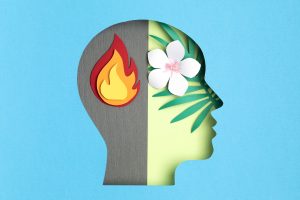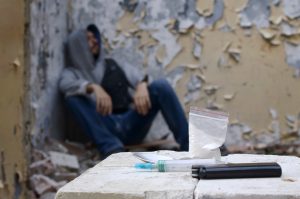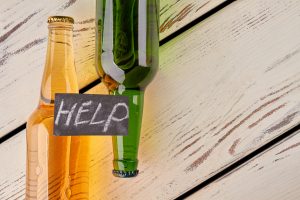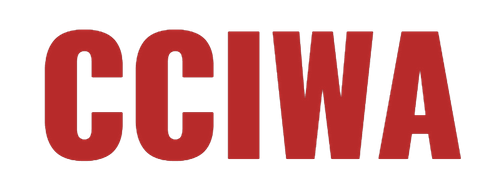Have you or your loved one been diagnosed with drug addiction? If so, then you may have heard of the term “dual diagnosis” in your medical diagnosis.
But do you understand what it means? Read on to learn more about dual diagnosis and understand the link between mental health disorders and addiction.
The Link Between Addiction and Mental Health
You are said to have a dual diagnosis or co-occurring disorder when you simultaneously have a substance use disorder and a mental health problem.
Addressing addiction or substance use disorder is not easy, and it becomes much more challenging when you have mental health disorders.
In dual diagnosis, both conditions present distinct symptoms that could affect your ability to work, attend school, maintain healthy relations, and handle life challenges.
Worse still, the co-occurring conditions further influence each other. Usually, a mental health disorder that goes untreated will worsen the substance use problem. And when substance use increases, so do mental health disorders.

Mental health disorders and substance abuse co-occur more often than people think. The Journal of the American Medical Association reports state that:
- About 50% of people with major mental health disorders are also afflicted by addiction.
- 53% of drug abusers and 37% of alcohol users also have one or more major mental health disorders.
- Twenty-nine percent of those with mental illness abuse substances.
Remember that substance use and mental health disorders do not improve when ignored. Instead, they worsen.
Still, it is essential to understand that you can do better. There are measures you can take to overcome your demons, mend your relations, and start on the path to recovery.
What Comes First: Addiction or Mental Health Disorder?
There is a close relationship between substance use and mental disorders like depression and anxiety. Abusing substances like marijuana can protract psychotic responses, while alcohol can aggravate the symptoms of anxiety and depression.
As a result:
Individuals often use drugs and alcohol to alleviate the symptoms of mental illnesses
They frequently abuse substances to cover the symptoms of underlying mental health disorders, address negative emotions, or alter their mood briefly.
Sadly, there are negative consequences associated with using substances for self-medication, and eventually, it gradually deteriorates the problems it was meant to treat.
Substance abuse increases a person’s risk for mental disorder
It is difficult to determine whether the use of drugs is a direct cause of mental issues since they arise from a complex blend of the environment, genetics, and other variables.
However, substance abuse could push you beyond the limits if you are already susceptible to a mental disorder.

For instance, research suggests that those who abuse opiates are at a higher risk of depression, while regular cannabis use is associated with a higher risk of developing schizophrenia.
Substance abuse can exacerbate the signs of a mental disorder
It can significantly worsen mental health symptoms or potentially trigger additional symptoms.
Substance abuse could also interact with prescriptions, such as anxiety medications or antidepressants, affecting their effectiveness at dealing with symptoms and deferring recovery.
Distinguishing a Dual Diagnosis
Identifying a dual diagnosis is quite a challenge. It takes a while to distinguish between potential mental health disorders and potential addiction to drugs or alcohol.
The mental disorder and the kind of substance that is abused, whether alcohol, illicit substances, or prescription drugs, affect the symptoms that manifest.
The symptoms of depression and cannabis abuse, for instance, could be exceptionally from those of schizophrenia and alcohol abuse.

There are, however, a few general indicators that you could have a dual diagnosis:
- Do you use substances to deal with painful memories or emotions, alleviate pain or stay awake?
- Do your drug usage and mental health seem interrelated? Do you experience depression when you take alcohol, for instance? Or do you drink when you are stressed or troubled by negative memories?
- Has anybody in your family struggled with alcohol or drug misuse or a mental illness?
- Do you ever feel anxious or depressed even when you are sober?
- Have you ever received treatment for your drug/alcohol addiction or mental disorder? Did your mental health lead to the failure of your drug rehab program or vice versa?
Dual diagnosis and denial
Denial is not uncommon among individuals with a dual diagnosis. Admitting your dependence on substances or how much these substances have impacted your life can be challenging.
Similarly, signs of anxiety, depression, and PTSD can be terrifying; you could dismiss them, hoping they would disappear. Or you could feel humiliated or terrified of appearing weak for admitting that you need help.
However, anyone can develop a substance use disorder or a mental health condition. And the first step to recovery is acknowledging you have a problem and asking for help.
Signs and Symptoms of Addiction
Alcohol, prescription drugs, and recreational drugs like marijuana and cocaine are some of the most commonly abused substances.
However, the kind of drug you take or alcohol you consume does not define a substance use disorder or addiction.
Instead, it boils down to how your drug or alcohol usage affects your relationships and quality of life. In other words, you have a substance addiction issue if your alcohol or drug usage interferes with your life.

Answering the questions below may help you recognize the warning signs of a substance use problem. Your chances of having an addiction problem increase with the number of “yes” responses you provide.
- Have you ever thought of cutting down your alcohol or drug use?
- Do you consume more alcohol or drugs to achieve the same effect on your perspective or mood?
- Have you attempted to reduce your consumption but failed?
- Do you hide how regularly you use alcohol or drugs?
- Are you using up your prescription drugs more quickly than expected?
- Are your family or friends concerned about your alcohol or drug use?
- Do you regret or experience guilt or humiliation for using alcohol or drugs?
- Have you made any regrettable decisions when intoxicated or high?
- Has your drug or alcohol usage interfered with your relationships, employment, or studies?
- Have you been on the wrong side of the law because of your drug or alcohol intake?
Signs and Symptoms of Common Co-Occurring Disorders
Depression, anxiety disorder, and bipolar disorder are some mental disorders that frequently co-occur with drug or alcohol addiction.
Common signs of depression
- Feelings of hopelessness and helplessness
- Strong feelings of guilt or worthlessness
- Loss of interest in routine activities
- Change in weight or appetite
- Anger, pain, and irresponsible behavior
- Change in sleep patterns
Common signs of anxiety
- Restlessness
- Excessive tension or worry
- Shortness of breath or racing heart
- Headaches, muscle tension
- Loss of concentration
- Insomnia
Common signs of mania in bipolar disorder
- Unrealistic beliefs
- Feeling euphoric or highly irritable
- Reduced need for sleep
- Rapid speech or racing thoughts
- Increased energy
- Hyperactivity
- Impaired judgment and impulsivity
- Anger
These are not the only mental disorders that occur concurrently with drug or alcohol addiction. Others include PTSD, schizophrenia, and borderline personality disorder.
Treatment For a Dual Diagnosis
A dual diagnosis is best treated through a comprehensive strategy that addresses the psychological condition and the drug abuse problem.
Getting therapy for both conditions from the same practitioner or team is essential for long-term recovery, regardless of whether your substance abuse or mental health problem started earlier.

Based on your unique problems:
- Mental illness treatment may include prescriptions, group or individual therapy, self-help techniques, dietary modifications, and peer support.
- Addiction treatment may involve detox, behavioral support, managing withdrawal symptoms, and support groups to help you stay sober.
Finding The Right Treatment Program
Ensure the therapy is research-based, the program is certified and authorized, and aftercare services are available to avert relapse.
You should also confirm that the program acknowledges your specific mental health concern. For instance, some programs could have expertise in treating anxiety or depression but not bipolar disorder.
Treatment programs use a wide range of approaches, but there are universal basics of efficient therapy you can consider:
- Treatment covers both your addiction and your mental health issues.
- You actively participate in making decisions, define objectives, and create change-related strategies.
- The treatment approach includes fundamental education on your condition and associated complications.
- You learn effective coping mechanisms for decreasing substance abuse, improving interpersonal connections, and handling life’s stresses, difficulties, and troubling aspects.
Dual diagnosis programs
A good program may help you:
- Consider the role of drugs in your life. That is done with utmost confidentiality, without criticism or fear of consequences. Individuals are comfortable discussing these problems when the conversation is confidential and without legal repercussions.
- Get a better understanding of substances, including how they affect people on medication for mental illness.
- Get a job or access services that might aid the healing process.
- Identify and create your recovery goals. A dual diagnosis therapist can assist you with your unique recovery objectives for both conditions if you determine that your alcohol or drug usage is becoming problematic.
- Experience counseling that is specifically meant for individuals with a dual diagnosis. You may access this alone, in a group setting with peers, family, or both.
Treatment Programs for Veterans with a Dual Diagnosis
Veterans with dual diagnosis tend to deal with multiple other issues. Substance use is a typical coping mechanism for military veterans with PTSD to deal with the painful memories or emotions linked with it.
The stress of deployment or war can worsen underlying mental problems.

These issues frequently take time to manifest once a veteran goes home, and they could first be misdiagnosed as readjustment.
Seeking treatment for dual diagnosis is crucial since they can cause serious issues at home, work, and everyday life if left untreated.
Self-Help For a Dual Diagnosis
You can adopt several self-help measures to deal with your addiction and mental illness and seek professional therapy.
Keep in mind that quitting drinking is just the beginning. Your long-term recovery relies on developing healthier coping mechanisms and making wiser decisions while navigating life’s challenges, in addition to continuous mental health therapy.
1. Manage stress and emotions
Develop stress management skills
Substance abuse frequently results from futile efforts to manage stress. Since stress is a natural part of life, developing suitable can help you manage it without abusing alcohol or other substances. Understanding how to manage your stress will help you avoid relapse and control your symptoms.
Cope with negative emotions
Most individuals turn to drugs or alcohol to numb negative feelings. The free Emotional Intelligence Toolkit from HelpGuide can help you deal with challenging emotions without turning to substance abuse, even if you feel that using drugs is the only way to eliminate those uncomfortable emotions.
Identify your triggers and establish a plan for action
Knowing the warning signs of a mental illness flare-up is crucial when managing both a substance addiction and a mental health condition.

Stressful situations, significant life changes, or poor eating or sleeping habits are typical reasons. Having a strategy in place during such moments is crucial to avoiding relapse.
2. Interact with others
Prioritize spending time with friends and family
The easiest relaxing method is to feel emotionally connected to others around you. Try to get together with those who love you regularly. If you have no close friends, making new friends and forming deep relationships is never too late.
Follow the doctor’s instructions
You may think that you do not need prescription drugs or treatment once you have quit drugs and feel much better.

But for those with co-occurring illnesses, abruptly quitting medication or therapy often triggers relapse. Always consult with your physician before changing your prescription or therapy routine.
Attend therapy or participate in a support group
Your likelihood of keeping clean increases if you attend therapy sessions or social support groups like Alcoholics Anonymous or Narcotics Anonymous.
3. Make healthy lifestyle changes
Exercise regularly
Physical activity is a healthy approach to reducing stress, calming tension, and lifting spirits. Strive to achieve 30 minutes or more of aerobic activity every day to get the most benefit.
Adopt relaxation practices
Consistent application of relaxation techniques, like progressive muscle relaxation, deep breathing, and mindfulness meditation, helps lessen symptoms of anxiety, stress, and depression while enhancing feelings of calmness and emotional wellness.
Practice healthy eating
Breakfast is a great way to start your day well, and you should eat small, frequent meals all day. When you forego meals, your blood sugar drops, which increases tension and anxiety. Including enough beneficial fats in your diet might improve your mood.
Take time to rest
Get at least seven hours of quality sleep every night, as sleep deprivation can make stress, anxiety, and depression worse.
4. Find a new purpose in life
You must create a new, rewarding life where addiction has no place if you want to stay sober in the long run.
Discover new hobbies and interests
Seek new interests, volunteer work, or employment that satisfies your need for purpose and meaning. When you are engaged in activities that make you feel good about yourself, using drugs or alcohol becomes less appealing.
Stay away from the things that trigger you to use drugs
Try to stay away from individuals, places, or actions that make you crave alcohol or drugs. That may involve making significant adjustments to your social life, including identifying new activities to engage with your old friends, cutting ties with them, and forging new relationships.
Group Support
Groups are incredibly beneficial for maintaining sobriety and providing a safe environment to seek support and discuss problems.
Treatment programs for dual diagnosis occasionally form groups that meet for aftercare services. Your physician or another healthcare professional could also refer you to a support group for persons with dual diagnoses.
Twelve-step programs for drug addiction can also be beneficial. These programs are prevalent, so you will likely find one within your community.

It is often better to join a group that treats both substance misuse and your mental health issue. These free, peer-led programs help members achieve and maintain sobriety through group support and a set of outlined guidelines known as the twelve steps.
Just ensure that your group understands the concept of dual diagnosis and psychiatric prescriptions.
Even with the best intentions, some group members could mistake taking such drugs for another addiction. You wish to feel relaxed, not rushed, in that environment.
Helping Someone with A Dual Diagnosis
It can be a roller coaster supporting someone struggling with addiction and mental health issues. The path to recovery can be rough, and resistance to therapy is not uncommon.
The best method of supporting them is to admit that you cannot do everything. You cannot compel someone to take their medicine, attend their scheduled appointments, or maintain their sobriety.
All you can do is make sound decisions for yourself, persuade them to seek help and provide moral support while protecting your sanity.
Seek help
Helping someone with substance abuse and mental health condition can be difficult and isolating. Ensure that you are receiving the emotional assistance you require to cope.

Discuss your situation with someone you can trust- Getting yourself some therapy or joining a support group might also be helpful.
Set boundaries
Be honest about how much care you can give without becoming overworked and angry.
Establish boundaries for disruptive conduct and uphold them. It is neither good for you nor your loved one to let concurrent disorders dominate your life.
Get informed
Learn as much as possible about your loved one’s condition and the treatment and recovery for substance abuse. The more informed you are about what they are experiencing, the more capable you will be of promoting recovery.
Be patient
It takes time to recover from concurrent conditions. Recovery is gradual, and relapse is quite common. You can make it through this terrible period together and retake control of your life, but you will need continuous support as you progress toward recovery.
Bottom Line
A dual diagnosis is a complex disorder requiring an integrated treatment approach.
Dealing with one condition leaves leeway for the other to worsen since the disorders frequently trigger each other. The patient loses the ability to maintain mental clarity and discipline.
Regardless of the treatment approach, recovery is effective when both conditions are addressed simultaneously.
Experienced experts at CCIWA understand what you are going through and are here to help you overcome your dual diagnosis issue. Contact us today to get started!


